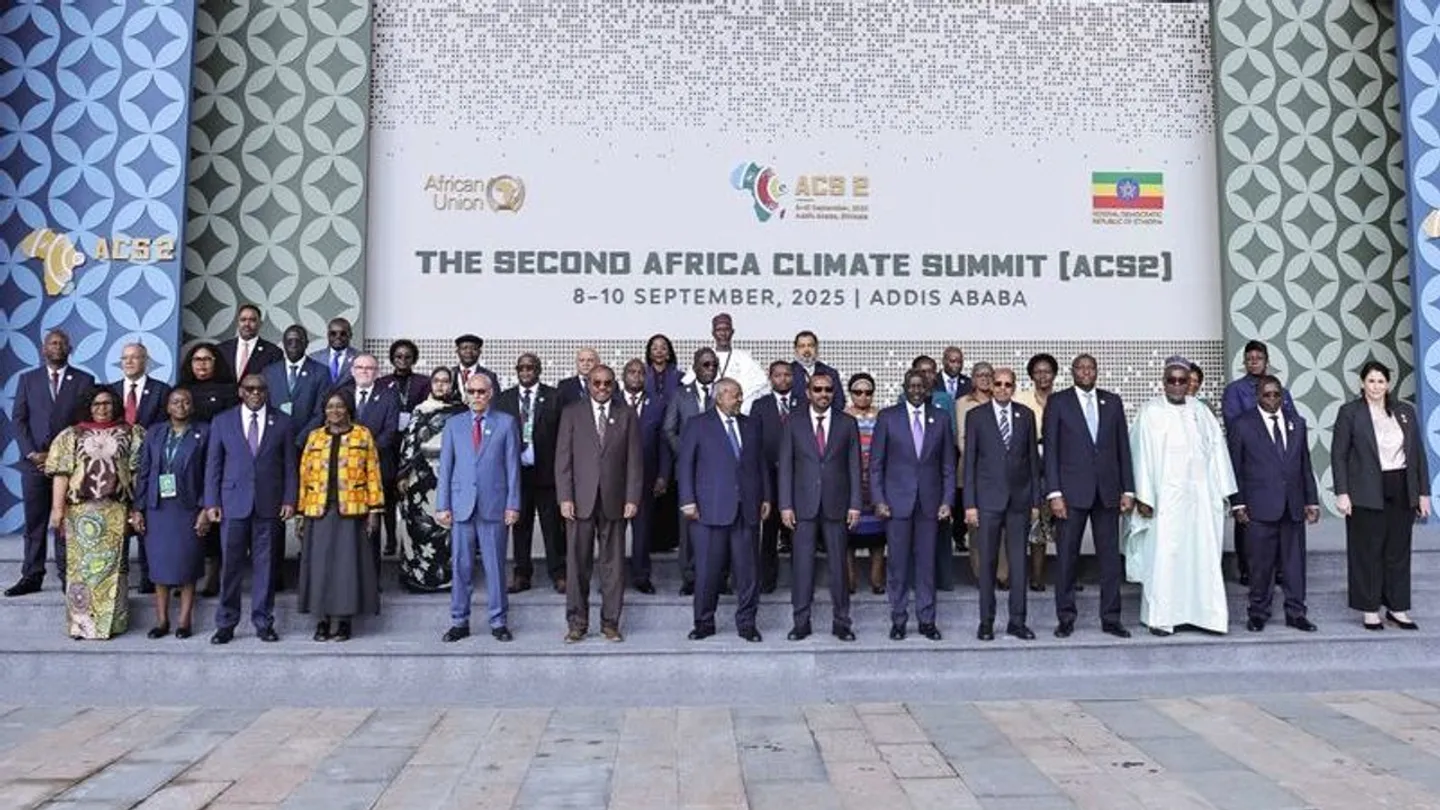The recently concluded Africa Climate Summit 2 (ACS2) in Addis Ababa took place under the theme “Accelerating Global Climate Solutions: Financing for Africa’s Resilient and Green Development” and had leaders, policymakers, scientists, youth, and civil society focused on key tracks: nature-based solutions, renewable energy and resilient infrastructure, climate finance, governance, energy transition, and green industrialization. What did this summit translate into in terms of Africa’s position in the run-up to COP30 on climate?
From Nairobi to Addis: What has changed?
Following the first Africa Climate Summit (ACS1), which took place in Kenya in 2023, the Nairobi Declaration set out a focus on green growth, and the imperative to reconcile climate action with industrial development. ACS1 is often described as a crucial moment and a narrative shift, identifying opportunities for Africa in the green economy. Governments, international development institutions, philanthropies and investors pledged a total of USD23 billion at the time. While ACS2 sought to build momentum from Nairobi 2023 by turning narratives into action, positioning Africa from the angle of a solutions provider and not the usual victim tags, there was also a growing momentum for consensus around the urgency of scaling investment, climate justice, and developing innovation ecosystems across the continent.
Compared to Nairobi, ACS2 pledges appeared scantier. One could argue that the lack of information on the performance of the 2023 pledges for climate finance for Africa has led to the seemingly silence in Addis. In addition, as COP30 has been dubbed the “implementation COP”, ACS2 was conceived as Africa’s contribution to this issue.
However, among the most ambitious announcements at ACS2 are: the establishment of an Africa Climate Innovation Compact to deliver 1,000 African-led climate solutions by 2030; the establishment of the African Climate Facility to mobilize USD50 billion annually in catalytic finance; and a USD100 billion pledge from African financial institutions for the Africa Green Industrialization Initiative (AGII) to finance green energy and climate-resilient infrastructure in order to drive a green industrial revolution on the continent. These pan-African announcements and pledges are laudable, but come with challenges of implementation and tracking progress, ensuring availability of funds, addressing bureaucratic delays and governance bottlenecks, as well as the longstanding debt burdens, and ensuring that projects reach local communities and subnational actors.
The political level of representation by heads of government was lower in Addis compared to the high-level attendance at ACS1. And the declaration process was led with no significant input from stakeholders with a rushed ministerial consultations before adoption. Subsequent summits should represent and embody a regional aspiration and ambition and not be the hosting country’s platform to drive national ambition.
Preparing COP30 positions and forging partnerships
However, a notable diversity of stakeholders (including regional economic commissions, financial institutions, youth organisations, gender activists, indigenous groups, academics, and private investors) shaped ACS2 and its outcome. Equally instrumental were pre-events such as the African Climate Week and the 13th Conference on Climate Change and Development in Africa CCDA-XIII, which helped integrate science, justice, data, and just transitions into the discussions ahead of the summit thus paving the path for COP30 positions.
In 2023, the Nairobi Declaration set the tone for a joint position at COP28 by calling for reform of international financial architecture, carbon tax regimes, enhanced climate finance and equity, repositioning Africa as a partner, not only an aid-receiver. The Addis Ababa Declaration builds on the Nairobi Declaration but with a shift from aid to execution. Scaling up investments in green industrialization, climate justice, and developing innovation ecosystems across the continent are among the issues that gained traction shaping Africa’s common position ahead of COP30. To realize these ambitions in economies that face fiscal constraints and high capital costs, Africa must unequivocally demand grant-based, concessional finance and not merely loans, and should push for investment mechanisms that unlock private capital. And it should ensure that financing is anchored on effective monitoring and evaluation including regulation and accountability. Africa’s climate priorities are: energy access, renewable capacity, green industry, food systems resilience and nature-based solutions.
Ahead of COP30, Africa must also: present a unified negotiating text reflecting Addis Ababa commitments towards the Climate Finance Facility, Innovation Compact, 300 GW renewable target, energy access for millions; expand its EU collaboration leveraging its promise not to give up on responsibilities; amplify the push for the reform of global finance systems: attract more grants, less conditionality, more concessional finance. With the ongoing implementation of African Continental Free Trade Area (AfCFTA), it is time to urgently integrate Africa into the global value chains and enabling trade environment to advance robust green industrialization.
Deepening collaboration around green innovation and industrialization could also be one of the objectives for delegates heading from COP30 to the AU-EU Summit that will take place at the end of November in Luanda, Angola. Both Africa and the EU could benefit from such mutually beneficial green industrial partnerships (IDDRI, 2024).
Looking inward, Africa must urgently scale up domestic capacities: in the creation of green job, skills, policies, institutions; while ensuring that the subnational actors are not sidelined—they must own implementation, especially in delivery of investment, energy transition, food resilience to make COP30 a true “implementation COP”.

